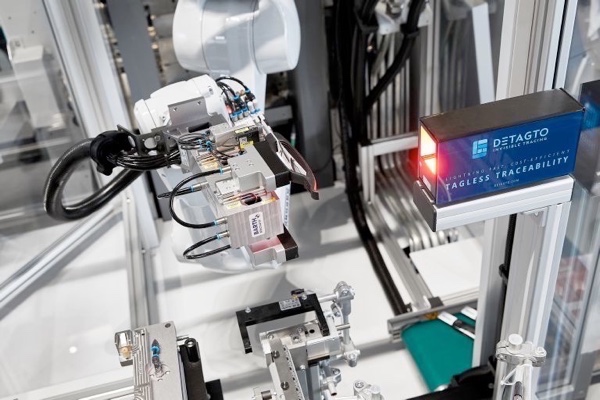Packaging
Allrounder 375 V: Transparency thanks to digital Fingerprint

Wednesday 27. September 2023 - The application example of a tyre lever will show how digitalisation and automation go hand in hand to produce plastic parts efficiently and with 100 per cent traceability. Each product is clearly identifiable using Invisible Tracing, a technology from partner Detagto.
Arburg will be present at Fakuma 2023 with nine exhibits on Stand 3101 in Hall A3, plus ten additional machines on partner stands.
The turnkey system with multi-axis robot, overmoulding of inserts and parts assembly is a sophisticated production solution with a high degree of autonomy. With the bicycle tool, tyres and inner tubes can be quickly and easily removed from the rim and mounted again.
Processing of recyclate (PIR)
The tyre levers are produced ready to use by a compact turnkey system built around an Allrounder 375 V with 500 kN clamping force and a 1+1-cavity family mould. The vertical machine overmoulds inserts with 50 per cent glass fibre-reinforced PA 66/6 into a “remover” and an “installer”. The insert is made of ISCC-certified POM, while the PA material is a single-grade post-industrial recyclate (PIR). The cycle time is around 45 seconds. The exhibit is equipped with Arburg’s recyclate package for homogeneous material preparation and consistently high product quality.
Space-saving automation
The complete parts handling process is carried out by a Kuka six-axis robot. No additional floor space is required for automation: the six-axis robot is suspended to save space and integrated into the machine controller. It first feeds clips provided via a vibratory bowl feeder to a camera inspection and inserts them into the mould. The removed moulded parts are given a DM code in a laser station. Then they are supplemented with operating instructions and the two-part tyre lever is assembled ready to use.
Mark-free “Invisible Tracing”
Before the tyre lever is placed on a conveyor belt, a camera system in a separate station photographs a defined area of the component’s surface. The comparatively new “Invisible Tracing” technology from partner Detagto is used here. The image data of the registered surface is converted into a few kilobytes of easily storable character string and compressed before being transferred to a database. As every surface has tiny differences, similarly to a human fingerprint, each component can be clearly identified later at a separate test bay – in a way that is reliable, tamper-proof and requires little effort.
100 per cent traceable using ATCM
On the exhibit, this invisible “fingerprint” is transferred to the Arburg Turnkey Control Module (ATCM) Scada system. To do this, the ATCM records the data from the injection moulding process for each component ID and links it with the results of the optical inspection of the insert and the digital fingerprint, thereby ensuring 100 per cent traceability. The part-specific data can be retrieved by scanning the DM code, e.g. with a mobile device.
